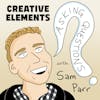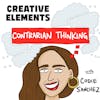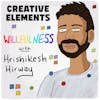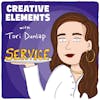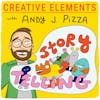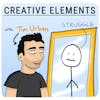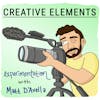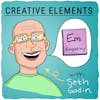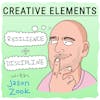
#9: Jason Zook – Learning the foundation, owning your weird, fighting fear, and showing up week after week
Play EpisodeJason Zook is a serial entrepreneur who has made millions through various "weird" methods: wearing t-shirts, auctioning off his last name (twice!), and selling off his future (BuyMyFuture.com).
Jason Zook is a serial entrepreneur who has made millions through various "weird" methods: wearing t-shirts, auctioning off his last name (twice!), and selling off his future (BuyMyFuture.com).
He lives in San Diego, CA with his wife Caroline. They co-own the business Wandering Aimfully and act as un-boring business coaches who help online business owners like you earn more so you can live more.
In this episode we talk about learning the foundational skills of running an online business, owning your weird, fighting fear, and showing up week after week.
Transcript and more can be found here
***
LISTENER SUPPORT
Join our community on Facebook
Support this show through Buy Me A Coffee.
***
SPONSORS
Try Podia and save 15% for life as a Creative Elements listener
Start your free trial of SavvyCal and get your first month free using promo code ELEMENTS
***
ABOUT JAY CLOUSE
Subscribe to my weekly newsletter
Enroll in my course on podcasting, Podcast Like The Pros
***
PODGLOMERATE NETWORK
This show is a part of the Podglomerate network, a company that produces, distributes, and monetizes podcasts. We encourage you to visit the website and sign up for our newsletter for more information about our shows, launches, and events. For more information on how The Podglomerate treats data, please see our Privacy Policy.
Since you're listening to Creative Elements, we'd like to suggest you also try other Podglomerate shows surrounding entrepreneurship, business, and careers like Rocketship.fm and Freelance to Founder.
Learn more about your ad choices. Visit megaphone.fm/adchoices
Jason Zook 0:00
The majority of people who sign up for Wandering Aimfully these days is not because they stumbled onto our website. It's because someone who's followed us for two years joined and then told a friend and then that friend joined. And, and that's kind of the place we find ourselves in. And that's just something that it's hard to tell people who're just getting started to go, you need to commit for a while.
Jay Clouse 0:20
Welcome to Creative Elements, a show where we talk to your favorite creators and learn what it takes to make a living from your art and creativity. I'm your host, Jay Clouse. Let's start the show. Hello, welcome to Creative Elements. We're getting a little bit weird today talking with my friend Jason Zook. You may also know him as JasonDoesStuff on Twitter, Jason Headsetsdotcom, or Jason Surfrapp, which I'll get to here in a minute. Look, Jason is one of the most unique creators that I've ever met. He's launched more projects than anyone else that I know. And that's why he is JasonDoesStuff, and it's worth running through a few of them. In 2008, Jason launched a business called I Wear Your Shirt, where he let people pay him to wear their branded t shirts and make a YouTube video every day. He did this for more than five years. He worked with more than 1,600 small businesses, and generated more than $1 million in revenue. Then in 2012, he decided that he didn't want his last name anymore. So he sold the rights to it. After a 30 day auction, Headsetsdotcom submitted the winning bid of $45,500, and Jason legally changed his name to Jason Headsetsdotcom. He did it again in 2013, changing his name to Jason Surfrapp for $50,000. Then he took that last name and authored a book called creativity for sale, selling ad space at the bottom of every single page and earning $75,000 in sponsorship income. I could go on and on about these. He's still running an online course platform called Teachery, and he has many, many more past projects, including several failed projects like Emoji Bombs, Unicorn.pizza, and Saddles for Corgis. But today Jason is one half of a husband and wife team running a business called Wandering Aimfully. He and his wife, Caroline, act as unboring business coaches who help online business owners earn more so that they can live more. They have a treasure trove of articles, guides, courses, software products, workshops, and a Slack community. I'm a part of that Wandering Aimfully Slack community, and I reached out to Jason after he published his second book, Own Your Weird: An Oddly Effective Way for Finding Happiness in Work, Life, and Love. He literally wrote the book on being weird, or at least a book. And I have to say, please watch the video, Matt D'Avella made with Jason about how to stop giving a fuck. I'll link to it in the show notes. But here I'm going to give you a preview as well.
Matt D'Avella 2:52
Oh, Jason.
Jason Zook 2:53
Hi Matt.
Matt D'Avella 2:55
Jason, thanks so much for being here. I really want to get better at not caring what people think. What should I do?
Jason Zook 3:00
Step one, you got to shave a mustache.
Matt D'Avella 3:02
I'm not gonna shave my mustache.
Jason Zook 3:04
Do it. Great. Step two, now go buy some short shorts.
Matt D'Avella 3:08
Personally, as a minimalist, I...
Jason Zook 3:10
No problem, I brought some. Size 26 waist, right?
Matt D'Avella 3:12
What does this have to do with not caring what people think?
Jason Zook 3:14
Oh, it doesn't, and I just wanted to see if you do it.
Matt D'Avella 3:17
Oh Alright. Cool.
Jason Zook 3:19
Alright.
Jay Clouse 3:20
This episode is a lot of fun. We talk about how Jason has made being weird a core value for him, the foundational stuff all creators should be comfortable with before getting too weird, avoiding comparison traps, and how discipline and resilience have been an important part of Jason's journey. I'd love to hear your thoughts on this episode. As you listen, you can find me on Twitter or Instagram @JayClouse. But for now,, let's wander aimfully into this interview. Now that I've done my best to introduce Jason, I started by asking him how he introduces himself to somebody new at a party.
Jason Zook 3:59
Oh, this is the worst. Oh man, this has evolved so much over the years. So I've gotten to this point where I'm like, kind of like old man curmudgeon where I just, I just wouldn't be at the party. You know, like, I just like, my truthful, honest answer's, like, I wouldn't be there. But the funny thing that happens with this is like, my wife, Caroline, and I will be traveling. And someone will sit down next to us. And they'll be like, what do you do? And so for me, I'm just like, I'm not at the party, you know, like, I'm not here. And so I'll just go, Oh, I'm a writer. And then like, No further questions. No one ever asks. And if they do, they're like, oh, where do you write for it? I was like, Oh, I have a blog. And they're like, okay, that's fine. And then she'l like, like, physically shove me and go, No, no, no, no, you're not allowed to, like, that be your answer. And it depends on the situation. Like if we just start you know, we're trying to get somewhere like she won't do it. But I think the best way I describe myself is that I'm an entrepreneur, and I dabble in a bunch of different things, whether that's software community, and then just really weird, interesting marketing ideas. And then I do write. Like, the thing I do the most, which is very interesting, I never thought I would be doing that, is write, You know, it's emails and articles. It's not like I'm writing, you know, tomes over here. But that is the thing that I do the most. So super long winded answer, but that's the truth. You brought me to your party, okay? This is what you get. Yeah, it's interesting when you write newsletters and articles, you tend to realize that after like three or four months, you've basically written a book. So by this point, with consistent writing over the past five years, I think I've written a total of 10 books in length of things that I've written, which is kind of crazy to think about. Now, we could argue that if any of it's good, that's a whole different discussion. But I have written just a ton of stuff. And I think that's, you know, just been something that's been really helpful for me both in getting through difficult times, but then also just exploring and experimenting and figuring out what we want to be doing and talking about.
Jay Clouse 5:46
I think I want to follow this thread a little bit here, like you, I've, I've written a lot. So as you're thinking about putting things together in a book, what is the order of operations for stitching these pieces together to get narrative that goes throughout the entire book?
Jason Zook 6:03
Yeah, so I am admittedly very bad at the weaving of threads through ideas. So I just will fully admit like, I can take action like it's nobody's business, I can sit down and start typing, I don't really have blank page syndrome ever, I can just go. And that doesn't mean that I'm writing good things; it just means that I can create. And what is helpful for me is to then know, okay, that's a weakness of mine. So like this, this book that we'll talk about, this second book, when I sat down to write it, I basically said, hey, I've written like 10 books and articles over the years, let me pull some of my best stuff from those articles and try and put that into a book and then add a whole bunch of extra through it. And then, so as I did that, what happened was my wife Caroline basically said, Hey, you know, I think the thread here is like that you're just doing things differently. And I've been talking about that, I've been saying that for years, but I didn't know that that was the narrative. I didn't know that was the thread. And so that was, that kind of, you then go back through it, and you go Oh, okay. So this is how when I became a minimalist, this is how I did that differently. When I started this business, I Wear Your Shirt, this is how I looked at the world differently. And you find that thread. And, and then there's actually an extra layer when you get into actually the publishing world, where you have a structural editor whose entire job it is to find something that then people on the outside can really latch on to. And that's how we actually made the shift from do it differently to Own Your Weird, which is the title of this next book. But that's how it happens for me. Admittedly, I need an editor. I need someone who has that narrative eye, because I am just notoriously bad at pulling and weaving the threads together. I think I'm just a more natural storyteller than I am anything else.
Jay Clouse 7:36
Help me get inside of your brain a little bit here, because between...
Jason Zook 7:40
I wouldn't do it. I wouldn't do it.
Jay Clouse 7:43
Between doing it differently and own your weird, it's clear that this is a core part of what you do. And so I'm curious, how much of that is something that you have to proactively think about and put on top of the things you're considering versus a lens that you just naturally see the world differently and act differently because of it?
Jason Zook 8:06
It's a little bit of both at this point. No matter what I do now moving forward, there has to be a different or weird angle. And so I think, you know, you clearly see that in all the things that we do. And that's not necessarily just in like every email or article that we write, although some people might argue that yeah, those are all had they have their own weird or different twist. But it has become this thing where I just know that no matter what I'm creating, if I'm not putting my own uniqueness into it or my own weirdness into it, I don't get fulfillment. Eeven if that thing gets retweeted a ton or a lot of people buy it or any of that stuff, the external metrics don't matter to me if my internal metrics are not being met. And so that has become a thing where I've really realized, as I've done these weird projects over the years--you know, I had my I Wear Your Shirt project, I had my last name selling project, I have my first book which was fully sponsored, I sold my future, which you became a part of at a certain point--and all of those things I realized, it wasn't so much the fact that they were a weird idea; it was that I was putting all of my own unique twist on these things, and that felt amazing. Like, then I actually put it out into the world, and then people paid for it, and then people appreciated it or what have you. That became really important. So now it's almost like a core value. So getting back to the root of your question, I look at uniqueness or weirdness or doing things differently, however you want to define that whatever makes the most sense to you, that's a core value bucket for me that basically every ideas goes through it as a filter. So Oh, I want to write or I want to create this new course. Okay, great, but how like, it just, it's a hard stop at that filter, and then we go, okay, it has to be weird or unique, and then it can kind of filter through as it gets that kind of twist put on it.
Jay Clouse 9:46
We live in a world obsessed with data, metrics and optimization. And for online creators, there are a lot of well known best practices that are backed up by data. So if you're intentionally owning you're weird, I wanted to know if you have to give up those best practices.
Jason Zook 10:02
I think there's a kind of a delicate balance where you almost in the beginning of your journey, if you're maybe just getting started or if you're just diving into some new area of the, you know, industry that you want to be in or some new complete industry you've never been in before, is that you, you have to follow a little bit of the well lit path, if you will, of what other people have done that has succeeded because you need to figure out what works before you just dive in and, go let me just uproot everything and do it all differently. And there's something to be said about, when is the right time to reinvent the wheel in something and when is maybe not the right time to reinvent the wheel but just add like a little like some sparkle lays onto the wheel, you know, like some tassels that's you know, splay in the wind and they're just wonderful. And so for me, I think now that I've been in kind of the like software, online education, writing, all of that world, I've kind of earned the ability to go, Okay, I know all of the like foundational stuff that works. Now it's about sprinkling a little bit of weird on everything. thing that I do, because I know it at the foundation. But I've also run into it the other way, where I've tried to go too weird too early, and people just don't get it. Like I tried to sell a, an E book a couple years ago. And the idea was, the book was called One Week to Profit. It was seven ways in seven days to make more money in your business. And I've wanted to sell it where only one person could buy it on the first day. And then on the second day, only two people could buy it. And on the third day, only three people could buy it. And it's kind of a fun way. Like, you know, this thing I've created called Bump Sale Pricing. It's a fun way to think about scarcity and urgency, but in a weird way. But I had actually never sold a book before. So I came up with this like whole unique, weird thing. But then all the feedback I got from people was like, Well, how do I know if this is any good? Like, I've never read anything from you. And I ran into this thing where I was like, oh, like I didn't create any like free lead up content to this. I didn't have like a really good sales page that like gave away part of it. I just said I have a weird way I want to sell an E book. Let me try that, and like that, no one bought it. I mean, I think I got up to like the sixth the day before I ran out of people that were interested in this weird idea. So I think it is about using the foundational stuff and the things that do work. I talk a lot about throw away the blueprint and create your own blueprint. And I do really believe that; but I think as far as it goes in business, you do have to do some of the foundational stuff like having a button on a sales page, like don't have a sales page is so weird, you can't find a Buy button. But maybe there's something that you can do in that process on the sales page that is unique or after the sale happens that is weird. And those are the things again, like, you can kind of sprinkle on top of the foundational stuff.
Jay Clouse 12:35
When we come back, we'll dive deeper into some of that foundational stuff you should know about right after this. With so much experience under his belt, I wanted to dig deeper and ask Jason about some of that foundational stuff people should focus on when they're getting started. Where should someone focus their energy in the beginning before thinking about sprinkling on that little bit of weird?
Jason Zook 12:57
Yeah, Austin Kleon found this narrative really well, which is show your work. And and that, that phrase, that simple three word phrase has never been more important, especially now or when you're getting started, no matter where you are in your journey. And that's what we've seen for years that has been the most valuable thing that we can do. And showing your work looks like a couple things. So if you're a designer, you need to be on Dribble, you need a kick ass portfolio website, and you need to be sharing your stuff on visual platforms like Instagram, like you just should be doing that. That makes sense. Now, should you do it like everyone else does it? No, you should find your own unique way. Like maybe you have, you know, three days a week where you do free design tips and you like Mondays XD tips and Wednesday is Photoshop tips. And Friday is Adobe After Effects. You know what I mean? You find a way to figure out what is different or unique. And if you're not a visual creative person, if you're someone who writes or if you're a coach or what have you, then you need to be able to tell stories, and you need to be able to share that work so that people can find you and go oh, this person is solving the problems that I need solving in my life, I should potentially hire them. And for me, what I think the most important thing is whether you're a designer, whether you're a coach, whether you're a marketer, whether you're a consultant, freelancer, whatever it is, is to have a core foundational website that clearly describes the problem that you are solving for people with some semblance of helpful content that is around that topic, like at least three to six to ten articles that you've written, that really define how you can help this these things. And then an email newsletter of some sort. And I just strongly believe in email--I know you use email really well--and I think that email is the thing that, as saturated and as busy as all of this is getting, having someone's email address and being able to directly contact them when they opt in is more powerful than any social channel you can invest time in, especially if you're getting started. Now, if you're further on down the road, and you have a lot of experience, okay, maybe we could talk about some other things. But even for us, email has been the thing year over year over year that has continued to drive 90% or more of all of our business revenue. We can tie it all back to email. And sure, there are some people like I found you on YouTube, but it's like two people. So it's not enough that we continue to spend all that time and energy. Instead, we should make our email content really great, our free content on our website really great and continue just to show the work that we're doing.
Jay Clouse 15:21
Can you talk about that a little more? I'm also a big believer in email. So for you guys, what are you seeing as the levers or the content that is bringing people into your email list?
Jason Zook 15:32
Yeah, so a couple years ago, I, I was just sending emails just randomly, and you know, okay, here's the thought or here's the story, and it was fine. And then I kind of had this reframing where I was like, What if I started every email with I want to help you. And if I said, I want to help you and then wrote the rest of the email, and then just remove the I want to help you part, then I actually had something that someone could get a benefit from, someone could get value from. And it became this little mental shift that was really important for me to realize, Oh sometimes I'm just writing meaningless crap. And it's not actually helpful. Now, there is a place and a time for entertaining content. But I think maybe the people who listen to this show and the people who follow us closely are not people who are necessarily entertainers. Like I don't consider myself an entertainer, but I know that sometimes I am entertaining. And that's not a core foundational thing; it's just kind of like a side benefit that that I can offer people. But I really think that if you can structure your content in a way where it is helping people with a specific problem that they are having, and one that you as the person who's writing about that really enjoy talking about, there is an audience to be built, there is a tribe to be cultivated, there is a customer group that is waiting to buy from you. And we've just seen over the years that as we have tried to help people in certain areas, we've attracted people. We've had people do word of mouth marketing for us, who will tell people like hey, I'm a part of this Wandering Aimfully community, they're going to go tell their friend. Like, the majority of people who sign up for wandering aimlessly these days is not because they stumbled onto our website. It's because someone who's followed us for two years joined and then told a friend and then that friend joined. And, and that's kind of the place we find ourselves in. And that's just something that it's hard to tell people who're just getting started to go, You need to commit for a while, you need to show up and be helpful for a while, you need to be consistent, you need to be the buzzword of authentic, but you need to be those things for people to build trust with you, especially when it comes to email because you're going to show up constant for them, and the more that you're delivering value to them, the more that they go, Yeah, this Jay Clouse guy, he's awesome. Every single week, he sends me a really helpful email, now he's opening up Unreal Collective and yeah, I want to join, like, I've gotten 37 emails from the guy, he's been really instrumental in my life. I'm in like, I don't need a sales pitch. I now know that I want this thing from him.
Jay Clouse 17:52
And that is exactly how I found Jason in the first place. Several years ago, he was running a program with Caroline called Buy Our Future, which allowed me to purchase access to Everything they'd ever made before, and everything they'd ever make afterwards, they sent me an email, and I signed up. And that became Wandering Aimfully unlimited. It's a great community. And I asked Jason, what the most common issues he sees coming up amongst that community of more than 500 members.
Jason Zook 18:15
I think, you know, some of it is comparison trap stuff. I think a lot of it is actually imposter syndrome. So you know, no matter what level you're at, especially if you're someone who's had success in one area, and then you want to move to something else, there's a lot of imposter syndrome when you go to a new thing. But there's the same imposter syndrome if you're just getting started from scratch, and you have no idea what's going on. And imposter syndrome, for me, is really just fear. Like that's, that's kind of all that it is. And I like to think about this as like, when you're getting started or you're making a change, fear is like, it's sitting next to you in a smart car. So you have this tiny car and these two seats and you're driving and fear's next year and is just screaming in your ear. And as you put more things out into the world, as you get further along in your journey, fear turns into like a 1983 Ford Taurus, you know, it's like a little bit bigger, but like, it's just right there, it's right behind you screaming in your ear, and so you can still hear it. But the longer that you do things, the more that you experiment, the more that you realize you're not going to get everything right, the more content you put out consistently, the more you show up as your true and honest self, the more that that car that you drive for your business or your life gets longer and longer, and it becomes like a stretch limo or a van or whatever, and fears like way in the back. And it's, it's always gonna be a muffled sound, you can hear. You know, no matter how many times you launch, whatever you're launching, or I launch projects I'm launching, there is always going to be like that, you know, something in the back, like, I don't know, that's never gonna go away. And, and what we see in the Wandering Aimfully Slack channel a lot is people who are just trying to figure out how to navigate those fears, and how to get over them and stop having those be roadblocks to trying to get the thing they really want to be doing and trying to have a life that really is meaningful to them. And I think there are a lot of people who don't ever give themselves a chance. And Wandering Aimfully has become this really magical place where someone will post something and people will respond, even if it's just a couple people before I can get to it--and I try and get to everything as fast as possible, because it's just like my full time job is to be in there. But people will help other people and go, hey, I've been where you are, it's not that bad. Or, hey, this helped me I read this book, or I watched this TED talk or whatever. And you find that when you just have two to three people who can tell you, I've been here, this has helped me, it's a world of difference in that person's life. And I just know it because people will send me messages and they'll go, Hey, this community is amazing, I've never been in a community that like has people that are thoughtful and helpful, it's always been about x product. And that's all anybody wants to talk about. And then like making six figures and like, how do I make more money. And that stuff's fine. But if you're not living a life that feels fulfilled, and if you're not constantly running into fear every single day, it can be really challenging to kind of get through those things. So it's really been this nice community that has evolved. Like you said, it's just around 500 people but it, it doesn't feel overwhelming, and we go through seasons, like it's these nice ebbs and flows to have kind of the times in life when we should probably all be taking a break anyway.
Jay Clouse 21:05
Speaking of taking a break, when we come back, I asked Jason how he avoids comparison traps with other creators finding success online. Welcome back to Creative Elements. Jason is one of my favorite follows on Twitter. And even though he has more than 30,000 followers, I think his perspective is still under appreciated. So much of Twitter is posturing and pretending like what you have to say is so profound. And Jason goes against that grain. He's a lot more honest, vulnerable, and actively talks about some of the elephant in the room. Things like comparing yourself to others. So I asked him how he avoids comparison traps to other online creators.
Jason Zook 21:41
It's tough. I mean, you know, I've been doing this now for, this is my 13th year of working for myself and creating things, and you know, I even have comparison traps of my previous self, which is, that's a weird one, right? Like, that's your leg down on the couch and we're talking about why you're talking yourself in the third person, like I'm laying down on the couch and I got to figure out a deal with this baggage that I carry. But I do run into this. I just ran into this recently with creating YouTube content. And I was looking around and I started to realize, man, I'm just running into this same thing that I tell people to avoid, which is, all I'm doing is comparing my tiny YouTube channel that I'm creating with Caroline, my wife, to these huge YouTubers that have these giant audiences and teams and all this other stuff. And it's like, just me, like, it's me and a camera and like, I edit everything myself. And we get a couple hundred views on videos, and now I'm just thinking these are crap because they don't get millions of views. And what am I doing? Like, what, like, am I creating videos because I want them to get millions of views? Sure, that would obviously be an outcome that everyone would like to get. But that's not the intention. At the beginning of it, the intention of the beginning of it is to share a message or share an idea or tell a story that I think is helpful that's helped me or us. And that's the point of it. And a couple years ago, I wrote this article that was like, basic title was, How to Define the Success of Your Art, like how you define it? And for everybody that's different. And what I found for me was publishing is how I define the success of my art, just hitting publish. It's not about anything else, and it's not about the millions of views or the people, the accolades or any of that. It's hitting publish and moving forward, like that to me is it's successful. Now, of course, there's also the weird part of it that's added on. But avoiding these comparison traps comes with, number one, defining what does actual success look like that I can control. So if I can control hitting publish, which we all can as creators, great, I've done it, I don't need to compare myself to all these other amazing people. But then also, as you move forward, it's then important to realize, is this content or are the things that I'm creating, serving my goals? And if they're not, then of course, I'm going to fall into comparison traps of even myself because they're not doing the thing that they need to do. And that's when you have to actually make the pivot or the shift and go, should I keep doing this? And that's actually, it's--real, real talk--that's what we're doing right now with all of our Wandering Aimfully stuff is should we have a YouTube channel? Should we have a podcast? Because if it's not my moving the needle for our business, it's kind of a waste of time. And we're just doing it because we think we have to do it and because everyone else is doing it, we can't actually tie real business results to it. And that's what we need right now is to get our business to a steady growing pace. And those things may not be the things that we spent a ton of hours doing that actually move the needle for that.
Jay Clouse 24:19
Super interesting. I'd love to dive deeper on that, because a lot of business owners that I work with are early stage freelancers, and they just assume they need to be on all the platforms. You know, I'm a solo lawyer, let me go out and register a Twitter account right now. You know?
Jason Zook 24:34
Yeah, yeah.
Jay Clouse 24:34
And a lot of times, I just think it just doesn't necessarily make sense. So when you think about the different channels that you guys are active in, how do you think about where you put your creative time and energy? And how long you run those experiments before you say like, let's double down over here?
Jason Zook 24:50
Yeah, it's really interesting. I actually just got caught up in a thread on Twitter, you mentioned Twitter. Someone had mentioned something about removing social media icons and buttons from articles and pages, like the share buttons. And I've been on this trend for years of just saying like, just stop, just take these things off your pages, because unless you can show me the data that they work, all they are are just things that confuse and distract people. That's all they do. Like when someone sees a Facebook icon now, it's no longer, Oh, yeah, I think I should share that. It's Oh, what's going on on Facebook? Let me go check because I'm addicted to Facebook. And I used to be that way. So I know what that feels like. And so this, this woman replied, and she was like, Well, I'm a social media strategist, nd like, these are really important. And I wrote back and I said, if they are working, and if you can show me the data that they are actually being clicked in us, then yes, you are correct. But for the majority of people, they are not being clicked and used, because a lot of them have numbers on them that all say zero, and you can tell that they're not working. And I think that this is the trap that we fall into when it comes to social media, especially the 2018, '19 now getting into 2020 social media is, Oh, you have to be on social media because it's where everyone's attention is. Yes, that's where everyone's attention. But actually earning their attention from social media is really difficult now, especially if you're not the lawyer who is doing Instagram in a super weird way, you know? Like that is where I think there's an opportunity on social media, and it's what we're trying to find for ourselves, too, is okay, we understand the value of social media channels, they are megaphones. They are there to amplify and to connect with people who are around and talking about certain things. But it's not a necessary thing. There are other ways that you can reach people. Social media just seems like the fastest. But I would argue now we're at the point where it's also some of the hardest because you have to make your account so different, you have to be so consistent, you have to deal with all of the scrolling through all of the feeds, that it just is very hard to stand out, and it's never been more crowded than it ever is right now.
Jay Clouse 26:49
So with all the projects that Jason has taken on, things like I Wear Your Shirt, Teachery, Wandering Aimfully, his books. I wanted to hear how the man formerly known as Jason Does Stuff actually does all this stuff.
Jason Zook 27:03
Discipline. And I think it's really overlooked when it comes to working for yourself. And I do think that there are a lot of people out there who have a sense of, Oh, I'm a disciplined person. But like after three months, if they don't see results they give up. And so that kind of fits into a second one, which is resilience. And so for me, discipline really means, I'm not wasting time all day, I know where my hours go every day, I know where the time sucks are for me, like I can get sucked into Instagram just like anyone else. I love all the puppy pics. I love the puppy pics, Jay. But I also know that spending two hours scrolling through Instagram and pretending that I'm connecting with people is not moving the needle for our business. And, and if I'm not working, then that's fine, I can be doing that. But if I'm actually like in a workday mode, I need to put that aside and do that. So for me, discipline has really become a thing that has been very powerful over the years, and I've used time blocking forever. So Google Calendar for me is basically my assistant, and it's actually more than my assistant. It's like my boss. So I put everything on my calendar, I block off specific time for it. And I'm fairly rigid about it. Now, if a day goes awry, and something happens, it always does for all of us, sure, I can move a block from today to tomorrow. But I have a rule for myself that I can't move a block on my calendar three times. So when I come up against the third time that I've moved it, I either have to do that thing, or I delete it and I don't do it because it wasn't important enough that I kept moving it, or it's so important that it got bumped a couple times, and now I need to hunker down and do it. So the discipline part is really helpful. The second thing is resilience. So things are gonna go wrong, things are gonna not work out. An email is gonna send improperly. This past week we had two emails get sent incorrectly, and it frustrated the hell out of me because I've been doing email marketing for 10 years, like, how am I still sending emails without links or whatever? You know, and it's just, it's the nature of the beast and what you realize is, you know, these things are going to happen. And one of the things I talk about in the book, there's a whole chapter on it, which is opportunities, not obstacles. So when you run up against something that can be difficult or maybe get in the way or goes wrong, you can look at it as an opportunity to do something better or an opportunity to have some fun and some levity. So as I sent out these wrong emails, and I got like five or ten people who replied back and they're like, hey, it looks like there wasn't a link. And I drove back. I was like, yeah, Gremlin got in the email editor while I was writing, like I was chasing them around, you know?
Jay Clouse 29:28
Gremlins!
Jason Zook 29:28
Yeah, I just took it, took it a moment to like, have some fun with it. And it was an opportunity for people just to write back and they were laughing, they we're like, Oh, that happens to me, like I've run into the email Gremlin, you know. Like, these silly things are the things that people, you're resilient about them, but you're also resilient about them in a weird way for me, and maybe that's not for everybody, but you find a way that it becomes an opportunity to just do something better or to learn. So I think those are two really important core things for me that have really helped, which is discipline and resilience in all the things that I'm doing, especially when it comes to building business and trying to get customers and kind of grow revenue.
Jay Clouse 30:03
Can you take us inside what your calendar actually looks like? And what those blocks on your calendar look like? Are they things like send an email or meet up with this person? Like what does that look like?
Jason Zook 30:13
Yeah, so like today's a really good example. So I got up in the morning so I blocked off one hour this morning for breakfast and social media. So I just knew that I had another interview coming up. So I was like, oh, I'm gonna want to promote this interview, I need to download the assets on Dropbox and all that stuff. But I also just wanted to eat breakfast and enjoy, you know, an hour of kind of time to myself before I dug into things. So that was one hour, first, first hour. So then I had an hour and a half blocked off for us. I knew we weren't going to use that time. But I know for me, in my experience, if I only block off the time that we're going to be talking, I'm going to run into an issue afterwards where I bumped something up too close. So I like to have some buffer time and so that I can decompress afterwards, kind of readjust and go from there. So after that, so I have an hour blocked off basically from 10:30 to 11:30 where I'm going to be writing an Instagram story and sharing an Instagram post about the interview that I was talking about this morning. And it may sound like a lot of time, but I actually put a lot of time and effort into those things to make them feel a little bit more involved than just like one slide that says, you know, whatever, it's, it's the story of why went to LA, why I sat down with these guys, what I chatted, what we chatted about, like it takes longer than you think. And I've also learned that as well. Like that's something where I just block off extra time for tasks where someone might go, it takes 10 minutes to post an Instagram story. Sure, number one, a crappy one. Number two, you know, if you can't find the photo, or you got to go download a thing, like I just, I've had so much repetition of this. So then after that, I think there's like an hour and a half blocked off for lunch. And then this afternoon, I have nothing on the calendar for this afternoon. So what I'll do during that time is I'll actually look at what are the things that Caroline and I are working on, and what do I need to be doing, and if I don't need to be doing anything, then I'll probably just do kind of the mundane tasks I do every day: email, check slack messages, intercom stuff. And a lot of times, if I have a full day, I'll have that time blocked off. Like email in the morning for an hour, email in the afternoon for an hour, and I won't check it the rest of the day.
Jay Clouse 32:11
I'll tell people all the time, I'll say, whatever you think you're gonna get done with your work or your business, if you look at your calendar and can't see where that's going to happen, it's not going to happen. And on the flip side, for me, I look at my calendar, and I don't see things blocked out, like breakfast or lunch, or proactively spending time making Instagram posts. And guess what, a lot of times those things don't happen.
Jason Zook 32:31
Yeah, we as entrepreneurs, people who work for ourselves, we tend to run into the, huh, three o'clock haven't had lunch today. That's interesting. And it's because it's not a priority. You get sucked into other things. And if you, you know, for me, I found early on that Parkinson's Law is real. So it's like, if you have an amount of time, and you think a task is going to fill that time, guess what, it will fill that time. But it doesn't necessarily mean it needs to. And so that's why I like having these content blocks with these buckets that really say I have an hour to check email. Even if I get like seven more emails in the last minute, I am quitting the email app that I use, and I'm not opening it back up. Those emails will be there for me later. And we've really found--and I've really found over the years that time blocking is such an effective thing. And, and you know this, we've talked about this on Wandering Aimfully a ton, which is our working to live mindset, where we actually block off life stuff first, every week. So we'll block off time for the gym, we'll block off lunch, block off breakfast, if we have any appointments or any things we want to do, or like fun stuff. If we want to go to the beach and spend three hours out, you know, just for ourselves, we'll block that time off and then after that, we go okay, now where does work fit into the rest of this, because why work for yourself if you're just prioritizing work first? You may as well just get a nine to five job and have that dictate your life. That's not why we started doing this. So we've just found that that kind of working to live mindset of prioritizing life first over work and then using time blocking to dictate how that happens. And just like you said, if it's not on the calendar, it doesn't get done. Same thing for us.
Jay Clouse 33:58
I remember going through like lm school and they tell a story of Thomas Edison, and how he was so dedicated that he would sometimes forget to eat. Yeah. And that seemed like such a bizarre thing to me when I was growing like, forgot to eat? What?
Jason Zook 34:09
I love peanut butter jellies, what do you mean?
Jay Clouse 34:11
Yeah.
Jason Zook 34:11
And it's, it's real, though. And I think that that's actually what leads to a lot of people, myself included, my wife, I know you've probably dealt with this, too. It's what leads to burnout. It's what leads to being stressed out. It's what leads to feeling like you have so many tasks to do and not enough time to do them. And it's because you allow too much time for a task to take that doesn't require that much time. And if you're really honest with yourself, you go, Oh, well, I was actually checking LinkedIn, and then I was checking my email, then I bounced over to Slack. And then I like had a call with a friend or I was doing this. And you're doing like seven things at one time when you should be just be doing one focused task at a time, get it done, and move forward.
Jay Clouse 34:48
The second thing you mentioned was resilience. And you talked a lot about things that you were doing not quite going as you expected. But I think resilience also applies a lot to external factors that come at you that you have to to react to. Can you talk about how that has made you played a role in your life and work?
Jason Zook 35:04
Yeah, and I think you can bleep this out if you want. But life shits on your face, like, let's be honest, it happens to all of us. And we see this constantly, even in Wandering Aimfully, because we have this tight knit community where people share, and they really feel like they can share when things go wrong. And you have a fully well intentioned person with a great plan. But then like their uncle dies, and their entire plan goes to hell. And we've experienced this for ourself. You know, we have like this perfectly curated launch plan. And then an a really unfortunate world event happens. And this has happened to us a couple times, and it's like during a launch and we go, Well, what do we do now, we don't want to be those holes that are selling something while like this global thing is going on. This is terrible. Like, we have to pivot and change and not do this and figure out what to do next. And I think that those are just things that if you put that in the forefront of your mind of Okay, something might go wrong in this--and again, opportunities, not obstacles--so when it happens, let me be prepared to figure out I'm gonna have to do a little trick shift here, I'm gonna have to change things up. And I just need to be open to that being a possibility. And for us, we've just seen it enough times over the years that it's inevitable. It, like an email doesn't go out at the right time, a sales page stops working for some reason, Stripe has an API update that they just decided to do in the middle of the day, like these things all come up that you can't control. And it's really about figuring out, number one, buffering in mental space for that to happen. But then also, okay, if this project, like if everything has to go perfectly lined up, you're screwed. You're setting yourself up for failure. So you need to have that time built in, you need to finish things ahead of time to, that's another thing we try and talk about a lot with, especially people who are creating a content calendar, or a new product is, get it done early. Get it done, like a couple weeks in advance, at least a week in advance. And we succumb to this as well, like then something will go wrong, and then you're running up against deadlines. But you know what? It's okay. Like you gave yourself a little bit of grace and you go, alright, well, maybe I can't do all the things I wanted to do, and maybe I need to bump this deadline back over. And I set that deadline anyway, so it's arbitrary. That'll be okay if people don't get it this week and if they get it next week.
Jay Clouse 37:05
It is always a pleasure to hear Jason's contrarian perspective on all things creativity. If you're like me, you're probably more convinced than ever that maybe it's a good idea to really let your freak flag fly a little bit, and embrace your weird. But I also want to really underscore what he said about both resilience and discipline. There is no way to have that type of creative output that Jason does without having a ton of discipline with yourself and your time. And to put that much creative work out into the world, especially if it's weird, you'll need to be resilient and not let people's opinions get you down. There will always be people who don't understand or appreciate your work, but you can't let that stop you. If you want to learn more about Wandering Aimfully and check out Jason's book, Own Your Weird or other past projects, I've linked all of that in the show notes. Thanks to Jason for being on the show. Thanks to Emily Clouse for making the artwork for this episode. Thanks to Brian Steele for mixing this show and also creating our music. If you'd like this episode, you can tweet @JayClouse, and let me know if you really want to say thank you, please leave a review on Apple podcasts. It goes a long way right now. But in any case, thanks for listening, and I'll talk to you next week.
Most Popular Episodes
New to the show? Check out some of our most popular episodes.












